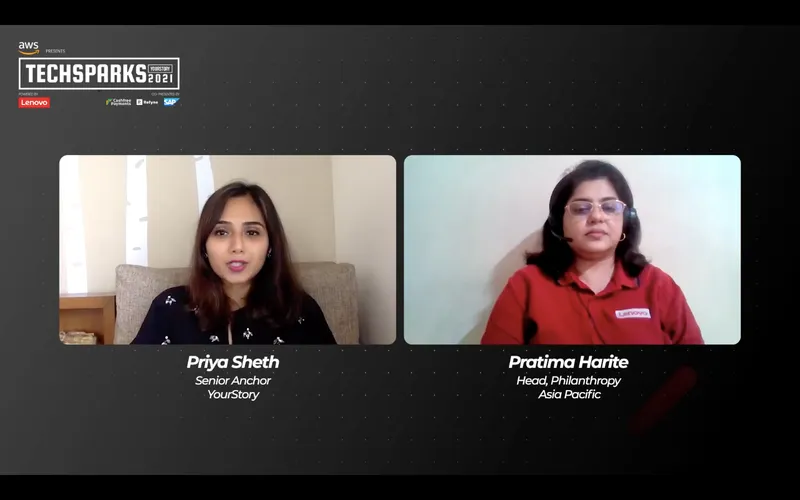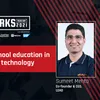Lenovo’s Pratima Harite on why scale is secondary and impact first for STEM CSR programmes
In a fireside chat at YourStory’s TechSparks 2021, Pratima Harite, Head of Philanthropy for Asia Pacific at Lenovo, emphasises the need to start STEM in the formative years of students in schools and what it takes to design impactful STEM CSR initiatives.
Today, with technology and digitisation becoming integral to every area of work and across sectors — from farming to art to fashion — the relevance of Science, Technology, Engineering and Math (STEM) skills is only growing. Added to it is the prediction that 80 percent of jobs in the next decade will require STEM skills.
At TechSparks 2021, Pratima Harite, Head of Philanthropy for Asia Pacific at Lenovo, explored the gaps and opportunities in STEM education in India and why it's time to not just focus on STEM skills but also build a STEM mindset.
Setting the context, she noted that STEM education goes beyond school subjects and inculcates a set of skills that governs the way we think and behave. “That kind of education actually helps us challenge and solve problems that the world faces today,” she said.
Pratima added that each STEM discipline offers a distinctive valuable contribution to a well-rounded education but with STEM education linking all the disciplines together, it “becomes a cohesive system that prepares young students into professionals who can transform society with innovation and bring in sustainable solutions.”

Gaps in STEM education
As India continues to establish itself among the top nations powering the next frontier in tech, one of the biggest challenges is in making science education accessible to the young population at scale, majority of whom live in economically challenging conditions.
“In the scenario, educational institutions will find it difficult to keep pace with the new concepts in scientific and technological innovations, and more importantly, include these latest developments in the STEM curricula in a holistic manner,” shared Pratima.
Here, the curricula, she noted, will need to be developed keeping in mind both the student's ability to assimilate as well as creating a mindset to get the students to understand STEM concepts by itself. Given that STEM education will be critical to finding jobs in the future,
Pratima emphasised the need to start STEM in the formative years of students in schools. “We need to identify scientific talent at the school level, so that you can hone on those strengths and enable students to etch out a plausible career trajectory based on the student's interest and intellectual tendencies,” she shared.
Content and infrastructure have been one of the major challenges in taking STEM education forward. “Today, there is a need to have STEM-related content easily available in the curriculum. We need teachers who in turn can teach these concepts and support that with STEM labs where students can experience the learnings,” explained Pratima.
She called for the STEM content to be adapted to local and vernacular languages to be able to reach out to students across the country. The need to build this STEM education infrastructure in terms of curriculum and labs, and support teachers, will require funding calling for corporates to collaborate in education.
Democratising access to smarter technology
Highlighting the work of Lenovo Foundation, the philanthropic arm of Lenovo, Pratima said, “The mission of Lenovo Foundation is to provide smarter technology for all by empowering the underrepresented communities with access to technology and STEM. Smarter technology is the fabric of not just Lenovo Social Outlook but also for its business.”
In India, Lenovo Foundation supports STEM education, digital literacy, ICT and skill training, as well as livelihoods across 17 states through 10 programme partnerships. And so far, the foundation has impacted 820,000+ students, teachers and youth across the country.
Sharing the impact of its teacher enablement programme implemented in partnership with Meghshala Trust, she shared that over the four years the programme has impacted 7,000+ teachers, 210,000 students in about 2,500+ schools across Karnataka, Manipur and Meghalaya.
The programme focuses on capacity building and training of teachers in STEM concepts and providing digitised content in local and vernacular languages. And, being an app-based programme, it found heightened relevance and acceptance during the first lockdown where it saw 18,000+ downloads.
Yet another highly impactful initiative, Lenovo Motorola Skill Academy trains young talent with a strong focus on women and works towards creating a sustainable means of livelihood from underrepresented communities.
The Academy was initially established in Tier II and Tier III cities to address the rising demand for field technicians and skilled labour in smartphone and computer repair markets. The programme also provides counselling, training, skill assessments and placements for talent who complete the programme.
“In the last two years, we have trained 2,900+ students in the field and positively impacted the communities and the technology industry. Of these, 1,500 students have been placed in jobs in multiple companies and industries. And 270+ students are working on their own, thus enabling entrepreneurship amongst youth,” stated Pratima.
She also shared that the Foundation’s Employability Skill programme in partnership with TechnoServe India provides opportunities to young women in adopting STEM careers in the IT and ITES sector.
“While this programme is conducted in Mumbai specifically for women, we also work with students from ITI colleges in Puducherry providing them on-the-job opportunities at Lenovo’s manufacturing plant,” she said.
Pratima emphasised that Lenovo’s CSR programmes not only focus on providing employability skills, but also are designed to be inclusive, where they look at both gender diversity and ability inclusion.
Driving innovation ground up
Pratima reiterated that innovation and science literacy depends on a strong foundation in the STEM areas. Here, she said that Lenovo’s STEM education programmes are designed in such a way wherein a student or a teacher who undergoes STEM education or skill also has the opportunity to practise what is being taught.
Taking the example of the Meghshala teacher enablement programme, she shared, “As part of the training on STEM concepts, we were also offering the teachers digital literacy skill training. This in turn helped them develop confidence in their own skills.”
And, when the schools shut down during the lockdown, teachers came up with videos that explained concepts and curriculum in the best way possible with limited resources.
She shared, “We saw teachers continuing to provide STEM content for the programme so that the students would not face a gap in their education. And, many of these teachers had just their smartphone, their skills and confidence to rely on. This, to me, is the strongest example of ground-up innovation and showcases the potential of furthering the stem mindset.”
Talking about some of the key learnings as an organisation that has been an early mover in the STEM education CSR space, Pratima shared that a CSR STEM education programme should not reinvent the wheel. “One needs to design and work with STEM programmes that complement the school curriculum so that the student does not have two different worlds to look at,” she said.
She called for bringing awareness about careers in STEM other than the standard career options in engineering or medicine - for both students and parents.
“Scale is secondary. It is about impact, first,” she said in her concluding remarks as she explained why Lenovo Foundation doesn’t think about scaling before truly understanding the impact it is going to bring to the beneficiary - be it the student in STEM education or the youth when it comes to skill training.
“Once we have established that the impact is strong, and it is really giving the social benefit that it is supposed to give, we think about scaling it up,” said Pratima.
To log in to our virtual events platform and experience TechSparks 2021 with thousands of other startup-tech enthusiasts from around the world, join here. Don't forget to tag #TechSparks2021 when you share your experience, learnings and favourite moments from TechSparks 2021.
For a line-up of all the action-packed sessions at YourStory's flagship startup-tech conference, check out TechSparks 2021 website.










